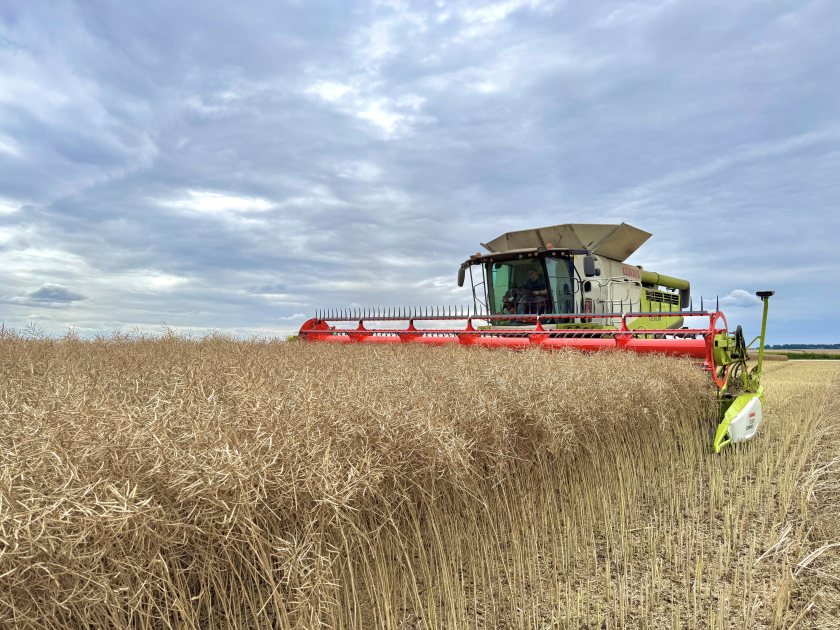
A Lincolnshire farmer has smashed the unofficial world record for oilseed rape yield, harvesting 7.52 tonnes per hectare from a September-sown field of LG Avenger — beating the previous record of 7.2t/ha set in 2019.
The 8-hectare crop was part of 85 hectares grown by Tim Lamyman at Worlaby Farms during the 2024/25 season, with LG Avenger making up 80% of the total acreage.
Sown between 10 and 20 September, the fields all performed exceptionally well: “All fields looked phenomenal throughout the season, with very little to choose between the sowing dates,” he comments.
It’s the first year Mr Lamyman has grown LG Avenger, a variety he praises for its “fantastic autumn vigour,” which was a key factor in his decision to try it.
The late sowing window helps reduce risk from cabbage stem flea beetle (CSFB), while the vigorous growth establishes a strong canopy heading into winter.
Having collaborated with Limagrain Field Seeds UK and United Oilseeds to tackle CSFB damage, Mr Lamyman believes sowing a robust variety later—ideally after 5-10 September—is the best way to minimise the pest’s impact.
“Even though flea beetle pressure wasn’t particularly high last autumn, I can see that in a bad year, the vigour of LG Avenger will help get through those issues.
"If you’re later drilling and you’ve got that vigour, you’ve got a much better chance of getting a crop established than if you’ve drilled it earlier in the season.”
Worlaby Farms typically prepares oilseed rape ground using Väderstad TopDown and Carrier cultivators before sowing with a 6m Väderstad Rapid drill.
Because of later drilling and stony soils, Mr Lamyman opts for a higher seed rate of 4kg/ha (around 65 seeds/m²) to ensure a thick crop.
Supporting LG Avenger’s vigour with a strong nutrition programme is crucial: “It’s a big, bold plant, which you’re making grow even faster, so it’s all beneficial.
"We’ve seen in the past that going down the route of shorter, low biomass oilseed rape simply hasn’t worked, so in my view, the bigger the crop, the higher the yield.”
The farm’s nutrition plan revolves around products from Bionature UK Ltd, aimed at boosting plant health and soil biology at key growth stages.
This begins early with applications of Leodita and Delta at the 2-4 leaf stage. Delta is a stabilised NH2 Nitrogen foliar feed, while Leodita is an organic soil improver that promotes strong root growth and acts faster than traditional DAP and autumn nitrogen, Mr Lamyman explains.
“Indeed, trials on the farm this year showed that within four days of applying Leodita, there was 40-60% more crop biomass compared with oilseed rape that received DAP. That biomass difference didn’t stop all the way through the autumn.”
The nutrition programme continues with foliar feeds in autumn and spring, including a calcium-based product at flowering to improve seed set.
He says: “Growing a fast, vigorous variety like LG Avenger, with this kind of nutrition programme over the top, gives you the ‘shield’ you need to get a late-drilled crop established very quickly in the autumn and probably gives as much biomass as something drilled three weeks earlier.”
Managing the large biomass crop has posed no issues: “It’s a really well structured variety, which also has the benefit of excellent pod shatter resistance.”
Disease control has been straightforward, relying on a standard fungicide programme with tebuconazole, prothioconazole, azoxystrobin and one SDHI fungicide: “It’s nothing very expensive, yet crops have stayed really clean throughout.”
Impressed with the results, Mr Lamyman plans to sow LG Avenger across his entire 90 hectares of oilseed rape next season — a decision he made even before harvest.
